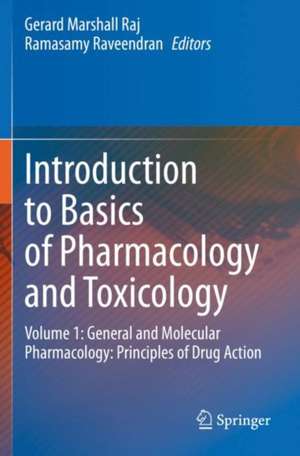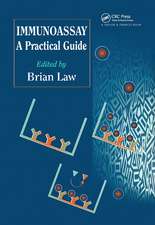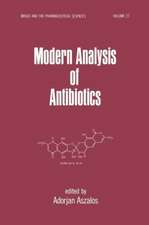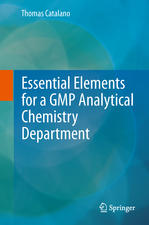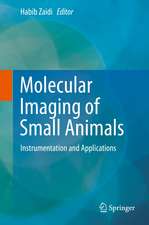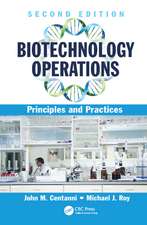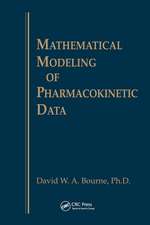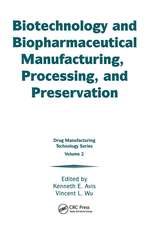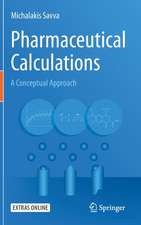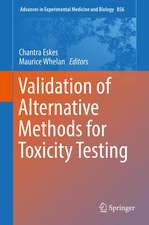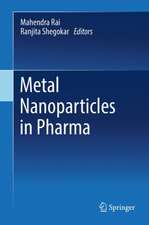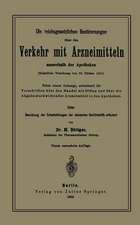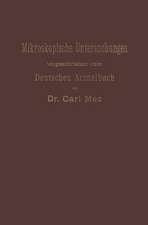Introduction to Basics of Pharmacology and Toxicology: Volume 1: General and Molecular Pharmacology: Principles of Drug Action
Editat de Gerard Marshall Raj, Ramasamy Raveendranen Limba Engleză Paperback – 29 noi 2020
Readers will learn about special topics in pharmacology that are hard to find elsewhere, including issues related to environmental toxicology and the latest information on drug poisoning and treatment, analytical toxicology, toxicovigilance, and the use of molecular biology techniques in pharmacology. The book offers a valuable resource for researchers in the fields of pharmacology and toxicology, as well as students pursuing a degree in or with an interest in pharmacology.
| Toate formatele și edițiile | Preț | Express |
|---|---|---|
| Paperback (1) | 895.42 lei 38-44 zile | |
| Springer Nature Singapore – 29 noi 2020 | 895.42 lei 38-44 zile | |
| Hardback (1) | 953.96 lei 38-44 zile | |
| Springer Nature Singapore – 29 noi 2019 | 953.96 lei 38-44 zile |
Preț: 895.42 lei
Preț vechi: 1178.18 lei
-24% Nou
Puncte Express: 1343
Preț estimativ în valută:
171.36€ • 178.24$ • 141.47£
171.36€ • 178.24$ • 141.47£
Carte tipărită la comandă
Livrare economică 10-16 aprilie
Preluare comenzi: 021 569.72.76
Specificații
ISBN-13: 9789813297814
ISBN-10: 9813297816
Pagini: 417
Ilustrații: XVIII, 417 p. 87 illus., 39 illus. in color.
Dimensiuni: 155 x 235 mm
Ediția:1st ed. 2019
Editura: Springer Nature Singapore
Colecția Springer
Locul publicării:Singapore, Singapore
ISBN-10: 9813297816
Pagini: 417
Ilustrații: XVIII, 417 p. 87 illus., 39 illus. in color.
Dimensiuni: 155 x 235 mm
Ediția:1st ed. 2019
Editura: Springer Nature Singapore
Colecția Springer
Locul publicării:Singapore, Singapore
Cuprins
Part 1. Historical Aspects of Drug Discovery.- Chapter 1. The Great Pharmacologists and Their Revolutionary Discoveries. Chapter 2. Indian Contributions to Pharmacology.- Part 2. General Pharmacological Principles.- Chapter 3. Sources and Nature of Drugs. Chapter 4. Principles and Modes of Drug Administration.- Chapter 5. Drug Absorption and Bioavailability.- Chapter 6. Drug Distribution.- Chapter 7. Drug Metabolism.- Chapter 8. Drug Elimination.- Chapter 9. Mechanisms of Drug Action.- Chapter 10. Drug Transporters.- Chapter 11. Adverse Effects and Pharmacovigilance.- Chapter 12. Drug Interactions.- Chapter 13. Structure-Activity Relationships.- Part 3. Special Topics in Pharmacology.- Chapter 14. Drug Information.- Chapter 15. Pharmacogenetics, Pharmacogenomics and Personalized Medicine.- Chapter 16. Chronopharmacology.- Chapter 17. Pharmacoepidemiology.- Chapter 18. Ethnopharmacology.- Chapter 19. Pharmacoeconomics.- Chapter 20. Orphan Diseases and Drugs.- Chapter 21. Fixed-DoseCombinations. Chapter 22. Translational and Reverse Pharmacology.- Chapter 23. Gene Therapy.- Chapter 24. Stem Cell Therapy.- Chapter 25. Principles of Prescription Writing.- Part 4. Toxicology.- Chapter 26. Environmental Toxicology.- Chapter 27. Basic Principles of Management of Drug Poisoning.- Part 5. Molecular Biology in Pharmacology.- Chapter 28. Regulation of Gene Expression.- Chapter 29. Proteomics.- Chapter 30. Techniques Involved in Studying Receptor Dynamics.- Chapter 31. Polymerase Chain Reaction.- Chapter 32. Southern, Western and Northern Blotting.- Chapter 33. Antisense Oligonucleotides.- Chapter 34. Recombinant DNA Technology.
Notă biografică
Dr. Gerard Marshall Raj. D holds an M.B.B.S. and M.D. in Pharmacology. Currently, he is working as an Assistant Professor at the Dept. of Pharmacology, Sri Venkateshwaraa Medical College Hospital & Research Centre, Puducherry, India. He has published two book chapters, one on ‘Intellectual Property Rights in Drug Development and Biotechnology’ in the book ‘Intellectual Property Issues in Biotechnology’ (CABI; ISBN: 9781780646534) and the other on ‘Intellectual Property Issues Surrounding Antimicrobial Agents’ in the book ‘Intellectual Property Issues in Microbiology’ (Springer-Nature; ISBN: 9789811374654). He was awarded the ‘Prof. M. N. Ghosh Gold Medal’ for outstanding performance during the M.D. Pharmacology course at JIPMER, Puducherry and has published many research articles, reviews, commentaries, case reports and letters-to-the-editor in peer-reviewed and indexed journals.
Dr. Ramasamy Raveendran, Dean (Research) -cum- Professor (Senior Scale) and Head of Pharmacology, JIPMER, Puducherry, graduated from the University of Madras and obtained his M.D. degree in Pharmacology from JIPMER, Puducherry and his Diploma in Clinical Pharmacology from St Bartholomew’s Medical College, London, UK. With over 34 years of research and teaching experience, his main interests include Computer Assisted Learning (CAL) and toxicology. He has authored 55 research papers, 7 CAL software packages and 1 book. He has also conducted more than 50 workshops on research methodologies, biomedical communication and biostatistics throughout India. He was chief editor of the Indian Journal of Pharmacology from 2001 to 2006 and is currently editor-in-chief of the Journal of Pharmacology and Pharmacotherapeutics (since 2010). Further, as the Dean (Research) of JIPMER, he is coordinating all research activities at the premier institute.
Dr. Ramasamy Raveendran, Dean (Research) -cum- Professor (Senior Scale) and Head of Pharmacology, JIPMER, Puducherry, graduated from the University of Madras and obtained his M.D. degree in Pharmacology from JIPMER, Puducherry and his Diploma in Clinical Pharmacology from St Bartholomew’s Medical College, London, UK. With over 34 years of research and teaching experience, his main interests include Computer Assisted Learning (CAL) and toxicology. He has authored 55 research papers, 7 CAL software packages and 1 book. He has also conducted more than 50 workshops on research methodologies, biomedical communication and biostatistics throughout India. He was chief editor of the Indian Journal of Pharmacology from 2001 to 2006 and is currently editor-in-chief of the Journal of Pharmacology and Pharmacotherapeutics (since 2010). Further, as the Dean (Research) of JIPMER, he is coordinating all research activities at the premier institute.
Textul de pe ultima copertă
This book illustrates, in a comprehensive manner, the most crucial principles involved in pharmacology and allied sciences. The title begins by discussing the historical aspects of drug discovery, with up to date knowledge on Nobel Laureates in pharmacology and their significant discoveries. It then examines the general pharmacological principles - pharmacokinetics and pharmacodynamics, with in-depth information on drug transporters and interactions. In the remaining chapters, the book covers a definitive collection of topics containing essential information on the basic principles of pharmacology and how they are employed for the treatment of diseases.
Readers will learn about special topics in pharmacology that are hard to find elsewhere, including issues related to environmental toxicology and the latest information on drug poisoning and treatment, analytical toxicology, toxicovigilance, and the use of molecular biology techniques in pharmacology. The book offersa valuable resource for researchers in the fields of pharmacology and toxicology, as well as students pursuing a degree in or with an interest in pharmacology.
Readers will learn about special topics in pharmacology that are hard to find elsewhere, including issues related to environmental toxicology and the latest information on drug poisoning and treatment, analytical toxicology, toxicovigilance, and the use of molecular biology techniques in pharmacology. The book offersa valuable resource for researchers in the fields of pharmacology and toxicology, as well as students pursuing a degree in or with an interest in pharmacology.
Caracteristici
Elucidates significant discoveries by Nobel Laureates in pharmacology Provides extensive information on the principles governing drug action Covers special topics in pharmacology that are hard to find elsewhere Introduces readers to topics such as drug poisoning and toxicology through highly engaging chapters Covers classical and cutting-edge molecular biology techniques employed in pharmacology
